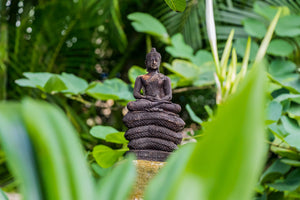Japanese "ZEN" philosophy is widely spread in the world. It is also said to be the origin of the mindfulness adopted by successful company executives and top athletes. However, there are not too many people who understand what Zen really is. Here, let’s see the history of Zen and its teaching.
What is ZEN?
Zen is an abbreviation for "Zenna," a transliteration of the ancient Sanskrit word "dhyana" which means "a state in which the mind is no longer upset." The practice to achieve that mind-state is called Zen meditation, or zazen.
Zen Buddhism as a religion began with the Buddhist monk Bodhidharma, who traveled from India to China. He is the 28th disciple of Buddha, the founder of Buddhism. According to a legend, Bodhidharma achieved enlightenment after meditating for nine years in front of a wall at Shaolin Temple in China.
"Furyumonji" is a word that simply expresses the Zen teaching of Bodhidharma. This means that enlightenment in Buddhism does not rely on scriptures or letters, but is directly transmitted from the master's heart to the disciple's heart. Bodhidharma relived the enlightenment of Buddha through his zazen training.
In other words, Zen is something that you understand with your heart. By abandoning all idle thoughts and focusing on "here and now", it aims to recognize the truth and our inner Buddha.

History of ZEN in Japan
Zen Buddhism was introduced to Japan in the early Kamakura period. Eisai and Dogen, who trained in China’ Songs at the time, laid the foundation for this.
Eisai opened the Rinzai sect, Japan's first full-fledged Zen sect, after visiting the Song court twice. Dogen opened the Soto sect 30 years later. Both are denominations that follow the Zen tradition, but their views on training are very different. While the Rinzai sect aimed for the path of enlightenment through the questions and answers between the masters and disciples called "Koan", the Soto sect emphasized "Shikantaza", which is dedicated to zazen.
Furthermore, in the Edo period, a highly-ranked priest from China, Ingen, established the Obaku sect, which meditated while chanting Nembutsu. Zen sect in Japan is roughly divided into three sect, Rinzai sect, Soto sect, and Obaku sect.
These Zen teachings spread from the samurai to the emperor family, the court nobles, and the general public, and had a great influence on traditional Japanese culture such as tea ceremony, flower arrangement, Nogaku, painting, and poetry. The aesthetic sense of "Wabi-sabi" that dwells in the hearts of Japanese is said to have evolved from Zen teaching.
Eiheiji Temple opened by Dogen
Eiheiji, the head temple of the Soto sect in Fukui Prefecture, can be considered a synonym for the Zen temple. It was founded by Dogen as a zazen training dojo in 1244. Many worshipers visit all year round, and in 2015, it received two stars in the French travel guide book "Michelin Green Guide Japan" and is attracting attention from home and abroad.
Eiheiji is different from general tourist destinations because nearly 150 monks called "Unsui" are still practicing strict Zen training according to the method established by Dogen 750 years ago. It is not just encouraging zazen, but also establishing the correct behavior of daily life – washing the face in the morning to how to eat, how to walk in the corridor, and how to clean. Everyday life itself is considered as training. You can feel the dignified world of Zen just by stepping into the precincts of Eiheiji.
Eiheiji also offers training experiences for general worshipers. If you are interested in the world of Zen, why not visit it once.

Zen is a word that expresses a free mind that is not bound by anything. It is a quest for self, a quest for truth. The Zen teaching brought from China to Japan developed independently and had a profound effect on the formation and maturity of Japanese culture. Understanding Zen will lead to a deeper understanding of Japanese culture.

